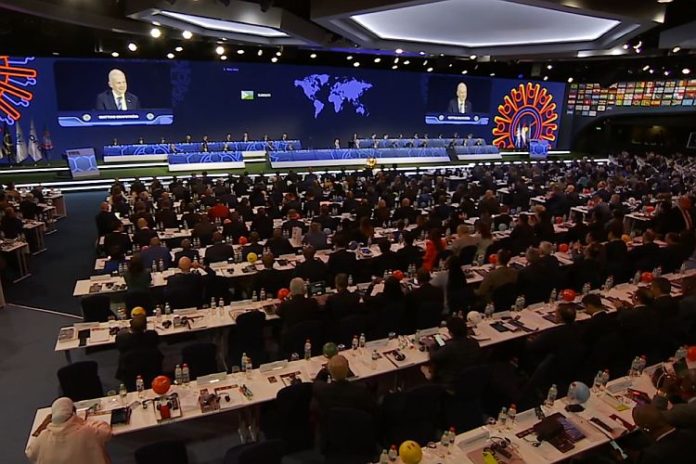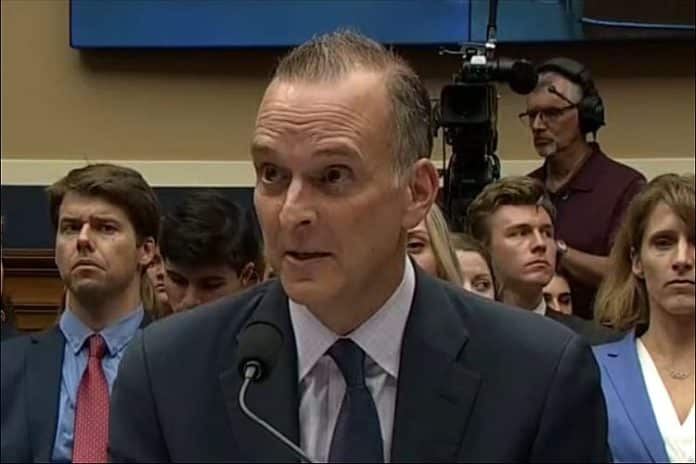★ The Sports Examiner: Chronicling the key competitive, economic and political forces shaping elite sport and the Olympic Movement.★
★ To get the daily Sports Examiner Recap by e-mail: sign up here! ★
≡ NOT EASY TO BE KING ≡
One of Shakespeare’s enduring truths came in Henry IV, Part 2, where he wrote “Uneasy lies the head that wears a crown.”
So it is for FIFA, which has been enjoying a tidal wave of attention, income and success, with the 75th Congress told that the revenues for the 2023-26 cycle are now estimated at a staggering $13 billion, with 62% of this amount already under contract. Of this, $11.67 billion has already been budgeted for re-distribution back into the football world, especially to its member associations. Some $1.23 billion will go for FIFA’s administration and commercial costs.
The increase from the previously-forecast $11 billion is another $2 billion from the Club World Cup, to be held next month in the U.S. Television rights account for about $1.5 billion and hospitality and ticket sales are forecast at $500 million.
Revenues for 2025 are projected at $2.436 billion, with $3.460 billion in expenses and an overall loss of more than $1 billion. For 2026 – a World Cup year – revenues are foreseen at $8.911 billion, with $6.394 billion in expenses for a surplus of $2.517 billion.
In March 2024, Major League Soccer Commissioner Don Garber noted correctly, as FIFA well knows:
“There’s no question now that America has become the ATM for the soccer world. We have raised the commercial value of the sport in our country in ways where it now is perhaps the most valuable soccer market, commercially.”
But tempers are beginning to flare and there is distrust and disagreement in some corners of the empire. These came to a head last week.
● The FIFA Congress
The annual meeting of the football world was in Asuncion (PAR), but for the most part, FIFA President Gianni Infantino (SUI) wasn’t there.
He was in Saudi Arabia and Qatar, organizers of the future World Cup in 2034 and the World Cup host for 2022, along with U.S. President Donald Trump, and Infantino spoke to a Saudi-U.S. investment forum, urging business leaders to invest in football.
So he missed all of the lead-up and committee meetings before the Congress itself on Thursday (15th), finally arriving two hours and 17 minutes after the planned start of the Congress at 9:30 a.m. local time, but pushed back to 12:30 p.m. to accommodate his private plane coming from Qatar.
He apologized in his opening remarks:
“As president of FIFA, my responsibility is to make decisions in the interests of the organization.
“I decided to be the last two days in the Middle East knowing the 2034 World Cup will be in Saudi Arabia and the World Cup in 2022 was in Qatar. The ’25 Club World Cup and ’26 World Cup will be in the USA, Canada, and Mexico. Some important discussions took place in regard to the World Cup, and I felt that I needed to be there to represent football and all of you. We had an issue with our flight, which made this delay happen. Apologies. Sorry, and I am looking forward to spending time with you here.”
After that, there was a break and the eight members of the FIFA Council from Europe left in protest, and UEFA issued a statement that included:
“The last minute changes to the timings of the FIFA Congress are deeply regrettable.
“Our hosts, the Paraguay [Football Association] and our partners at CONMEBOL, had gone to considerable effort to accommodate so many delegates and we thank them for their hospitality.
“But to have the timetable changed at the last minute for what appears to be simply to accommodate private political interests, does the game no service and appears to put its interests second.
“The FIFA Congress is one of the most important meetings in world football, where all the 211 nations in the world’s game gather to discuss issues that affect the sport right across the world.
“We are all in post to serve football, from the streets to the podium, and UEFA members of the FIFA council felt the need on this occasion to make a point that the game comes first and to leave as originally scheduled.”
Others brushed off the protest, with CONCACAF President Victor Montagliani (CAN) saying, “if someone is late, they’re late.”
● FIFA Club World Cup 2025
Although FIFA forecasts $2 billion in revenue from the expanded Club World Cup, being held in the U.S. starting next month, it hasn’t been all smooth sailing.
Ticket sales have lagged; in February, Inside World Football reported:
“The cheapest tickets for the final were being offered at $300 instead of the original $890. For the semi-final, supporters can now buy a ‘cheap’ ticket for $140 instead of $526. In the round of 16, ticket prices for the lowest category have also dropped with FIFA insisting that the price drop is to reward loyal fans.
“Ticket sales have been sluggish, but FIFA has failed to provide any updates on sales figures.”
In April, a tie-in sales effort for the 2025 Club World Cup attached ticket availability for the 2026 World Cup to boost interest in the tournament. The opening game is on 14 June in Miami.
● FIFA World Cup 2030
The centennial World Cup was arranged oddly to create an opportunity to hand the 2034 World Cup to Asia or Oceania, and more directly to Saudi Arabia. While a combined bid by Morocco, Portugal and Spain was handed most of the event, three “centenary celebration” matches are scheduled to start the 48-team, 104-match tournament, in Argentina, Paraguay and Uruguay, which hosted the first tournament in 1930.
That allowed FIFA to declare that the “turns” of Europe, Africa and South America had all been taken. But the South American confederation – CONMEBOL – was hardly impressed.
So, CONMEBOL chief Alejandro Dominguez of Paraguay, continues to suggest that the tournament – only for the centennial year of 2030 – be specially expanded to 64 teams … which could allow the South American hosts to host many more matches and actually some benefit from being a “World Cup host” in 2030.
It’s a financial play for sure, but clever and makes about as much sense as anything else in the FIFA world. But others are against it, worried about a future permanent expansion of the tournament to 64 teams. But there is no reason for Dominguez to give up, and Infantino said in his closing comments:
“The 100-year celebration will be something special. And I want to underline the words of Alejandro in this speech. He told all of us to think on how we can really celebrate it in the way it deserves to be celebrated. So every idea is a good idea.”
● FIFA World Cup 2034
Infantino worked hard to arrange the 2030 award to have Saudi Arabia awarded the 2034 World Cup, and it was. But by doing so, he invited a continuation and expansion of the criticism from human rights advocates see in the run-up to the 2022 World Cup in Qatar, which was considered a success from an athletic point of view.
Last week, Human Rights Watch and the labor activist group FairSquare criticized FIFA’s lax oversight of the Saudi building effort, with Human Rights Watch Global Initiatives Director Minky Worden (USA) said:
“The 2034 Saudi World Cup will be the largest and most expensive ever, but it could also have the highest cost in human lives, as millions of migrant workers build infrastructure, including 11 new stadiums, a rail and transit network, and 185,000 hotel rooms.”
On Thursday, a group of British and Swiss lawyers filed a grievance through FIFA’s own channel, demanding that it follow its own regulations requiring host-country human-rights compliance. From the complaint:
“FIFA’s decision to approve Saudi Arabia as the next host country now places FIFA, in accordance with its own policy, under an obligation to ensure that internationally recognised human rights are upheld in Saudi Arabia.
“To date there is no evidence that such steps have been initiated, let alone that FIFA has any intention of doing so. This complaint highlights these failings so that they can be rectified without delay.”
The grievance cites areas needing support that include freedom of expression and association; arbitrary arrests, mistreatment and the death penalty; judicial independence; migrants’ rights; and women’s rights.
¶
None of these issues threaten the tournaments, and Infantino can be elected for another term as FIFA President, through 2031, so he isn’t going anywhere.
But despite the enormous amounts of money coming in – especially with the Club World Cup and FIFA World Cup being held in the U.S. in 2025 and 2026 – this turmoil can make things uncomfortable.
Nothing is easy and FIFA will have challenges ahead of it, including with the 2026 World Cup in Canada, Mexico and the U.S., and while there are predictions in some quarters of problems for fans getting into the U.S., especially, next year, Infantino can always turn to his friend, the President of the United States for assistance.
That was part of his investment in time in Saudi Arabia and Qatar last week, and if problems crop up, he’s betting on a critical payoff from Washington.
¶
★ Receive our exclusive, weekday TSX Recap by e-mail by clicking here.
★ Sign up a friend to receive the TSX Recap by clicking here.
★ Please consider a donation here to keep this site going.
For our updated, 694-event International Sports Calendar for 2025 and beyond, by date and by sport, click here!



























